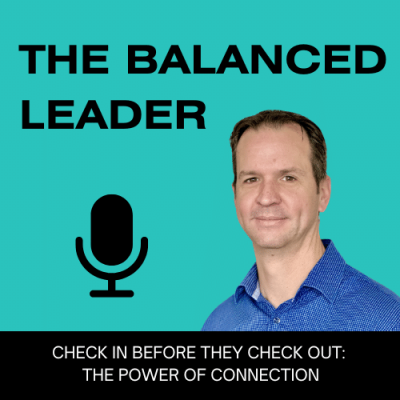Employee engagement is declining—and in this solo episode, I’m sharing why a regular, human check-in could be the most underrated leadership tool you’re not using. I’ll walk you through how a 30-minute chat over coffee can make all the difference, how I track my team’s wellbeing with a simple 1 to 10 scale, and why noticing the trend is more important than any one-off answer. If you’ve ever wondered how to lead with more empathy without adding another thing to your already-packed calendar, this one’s for you.
This episode is full of practical ideas you can apply right away, without needing a single new system or strategy. Just a bit more heart. Let’s check in.
Chapters
00:00:08 Welcome
00:00:42 Introducing the power of the Check In
00:01:14 Surprising figure about engagement in the workplace (according to Gallup)
00:03:00 What’s a good check in look like?
00:03:18 My wellbeing rating system, a tool I swear by!
00:04:13 Case Study: Microsoft CEO Satya Nadella
00:05:41 This weeks challenge for you

Welcome to The Balanced Leader Podcast, where we tackle the ultimate challenge for leaders: achieving peak performance without sacrificing your wellbeing. If you’re ready to lead with clarity, energy, and impact—without burning out—then you’re in the right place.
I’m Rob Hills, your leadership and wellbeing coach, and in each episode, I’ll give you the insights, tools and strategies that will enable you to thrive. So without further ado, lets dive into todays episode.
Today, we’re talking about a deceptively simple but incredibly powerful idea: “Check-in before they check out.” And no, I’m not just talking about people handing in their resignation letters — I’m also talking about when people mentally check out, disengage, or quiet quit. The warning signs are subtle — but if we’re paying attention, we can spot them early and turn things around.
Let’s start with where we are right now.
According to Gallup’s 2023 State of the Global Workplace report, only 23% of employees globally are engaged at work. That means more than three-quarters of people are just going through the motions — or worse, they are actively checked out.
That’s a massive opportunity for leaders. Because the single most powerful driver of engagement? It’s not perks. It’s not performance bonuses. It’s you — the leader. Your interest, your time, your presence. And I’ve seen this throughout my own career, the best leaders are the ones who genuinely care about their team!
Now, I get it — we’re all busy. You’ve got meetings, reports, KPIs, emails, maybe even an overflowing inbox with things marked “urgent”. But checking in with your team doesn’t need to be another thing that drains your day. It can be a 30-minute coffee chat. It can be a walk around the block. It can even be a quick Zoom with no agenda.
But you know what, these moments actually matter more than most of the stuff on your ever growing to-do list.
There’s a quote I keep coming back to — you’ve probably heard it before:
“People don’t care how much you know until they know how much you care.”
— Theodore Roosevelt
It’s one of those truths that never goes out of date. You might be the smartest person in the room, have the best strategy, the clearest plan — but if your people don’t feel like you genuinely care about them, they won’t truly follow you.
And the reverse is also true — if they do know you care? They’ll often go the extra mile, not because they have to, but because they want to.
Let’s talk about what a good check-in actually looks like.
It can be a discussion about projects or performance. It can include as much work talk as you need, but you have to set aside a large chunk of the time to genuinely connect with the person and find out how they are travelling.
One thing I find incredibly useful is at end of the check-in, I ask the person to rate their wellbeing on a scale from 1 to 10. No pressure, no judgment. Just, “Where are you at today?”
And here’s the thing — most people will say 7. It’s kind of the safe middle ground. Not too low, not too high. But over time, that number becomes a baseline. So if someone suddenly says “5,” or you notice it creeping down, you’ve got a gentle opening to ask more questions. And you’ve already built the trust to do it.
It’s not scientific, but it’s powerful. And most importantly, it shows your team you’re paying attention — not just to their output, but to them.
Let me give you a real-world example.
When Satya Nadella became CEO of Microsoft back in 2014, he inherited a culture that was often described as competitive and hierarchical. But he brought in a different approach — one rooted in empathy. He actually encouraged leaders to listen more, to understand their people, to prioritise psychological safety.
He even said, “Empathy makes you a better innovator.”
Under his leadership, Microsoft’s culture shifted dramatically. Employee engagement went up. Innovation improved. And the company became one of the most valuable in the world.
All because a leader made it a priority to listen, to check in, and to actually care.
Think of your team like a garden.
If you only check on your plants when they’re drooping or turning brown, it’s already too late. The damage is done. But if you check in regularly — feel the soil, pull a weed, give them a bit of water — they thrive.
It’s not about being perfect. It’s about being present.
Leadership isn’t a one-time fix. It’s about ongoing care.
So here’s your challenge this week: Book one check-in with someone on your team. It doesn’t need a big agenda. Just start with “How’s your week going?” or “What’s been energising — or draining — for you lately?”
And if you want to try it, tell them about the wellbeing rating system and ask for that 1 to 10 score. See what happens.
Because when we check in consistently — when we show up, listen, and care — we build cultures where people actually want to show up too.
And that’s the kind of team that gets results — without burning out.
Thanks for listening today, I hope you found this useful. Take care, and I’ll talk to you next time on The Balanced Leader Podcast.
